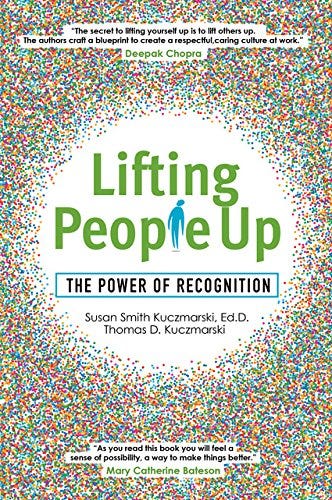
The motivation, whether conditioned in us from our childhood or developed later in life, to write “Thank You” notes can be developed into a natural response to receiving various types of value from other people and it benefits the giver and receiver.
Why do we choose to put our happiness, respect or manners in writing and what does it mean to us and maybe those we appreciate?
“Written expressions of gratitude are extremely powerful. Seeing written words of gratitude and praise can make the recognition ‘pop’ and we can go back and reread it again,” says Susan Kuczmarski, the author of “Lifting People Up: The Power of Recognition.”
“It has the potential to really sink in. Handwritten thank you notes or emails, when someone has accomplished something noteworthy, can have a lasting and significant impact.
“Extraordinary over-the-top performances,” Kuczmarski adds, “might even warrant some kind of a small gift — a book or lunch or coffee out — to further express appreciation, although this is not necessary.”
There is the matter of manners too, says one professional, in saying “Thank You.”
“Taking the time to pen three lines in three minutes is the least you can do to thank someone for what they did for you,” says Lisa Mirza Grotts, a 25-year certified etiquette expert, who says the practice of writing such notes “should be as common as flossing your teeth.”

There are different ways to communicate how we feel in such a message.
“I aim to make notes as personalized as possible,” says Steffo Shambo, the founder and CEO at Shambo Consulting. “I reflect on exactly what actions or qualities I am grateful for and their specific emotional impact. This allows me to articulate my appreciation in a heartfelt, meaningful way.”
“I like to share my appreciation of the gift or the event or meeting and let the recipient know I value their time, kindness and thoughtfulness,” says Lori Saitz, CEO at Zen Rabbit. “I'll also make reference to something they said or how their gift will be of value to me moving forward.”
“The rules for a thank you note or perhaps my rules,” says Anthony Damaschino, a self-proclaimed recovering HR executive and author of two books on Empty Nesting, “Number one, thank them right away. A month later diminishes the appreciation. Number two, thank them specifically for the thing or action. Number three, tell them what you are going to do with it or how they helped you and number four, sincerely reiterate your appreciation.”
“I use specific and enthusiastic information and praise,” Kuczmarski says. “The more detailed and descriptive the information, the better.
“‘Thanks for your good work’ or ‘You did a terrific job on that assignment’ simply doesn’t cut it. Instead, add specific information, put a WOW in your voice tone and express gratitude with enthusiasm.”
The act of showing a person that we value them and their thoughtfulness is kind but not just beneficial to them.
“I always feel an extra boost of energy when I take time to write out a ‘Thank You’ note, which makes sense given that gratitude changes your brain activity,” Saitz says.
“From a practical standpoint, I once received a job offer because I was the only one of the candidates who took time to send a thank you note after the interview. So all things being equal, that was the differentiating factor that swayed my new boss to offer it to me.”
“In the majority of cases, I write a thank you note for myself to express appreciation. I also hope it brings the receiver a good feeling of being appreciated,” Damaschino says.
“Showing you care forms a lasting impression. My motivation has a lot to do with truly caring,” Kuczmarski says. “Small acts of expressing gratitude — cards, notes and emails — not only convey emotion, encouragement, support and interest, but they help to steady people during the tough times. They also create an enhanced emotional connection between the giver and the receiver.”
This practice can impact the person who writes and gives the “Thank You” card.
“Psychologically, we live in a world where everyone focuses on themselves and is busy,” Damaschino says. “A thank you note shows next level emotional intelligence and that one cares about others beyond themselves.”
Paying attention to the emotional effects on people can be revealing.
“Acts of kindness and love, such as ‘Thank You’ notes, are supremely powerful in terms of human well-being,” says Jo Hayes, an etiquette expert and consultant and the founder of Etiquette Expert.
“I can see the recipients of these notes visibly soften, they exhale and their shoulders relax, like they’ve come into a safe space, a sort of love glow where they feel safe, seen, known and loved.
“They’re always so appreciative. It really can soften the hardest heart. It may sound corny, but love really is the answer to everything.”
“Getting a thank you note in the mail is so rare. Getting anything in the mail is pretty rare these days,” Saitz says. “In my experience, recipients are always thrilled and honored to get a thank you note, in part because it shows that someone took a few minutes to get a card and then thoughtfully write out their grateful words.”
“I've also seen that recipients tend to hold onto these notes, keeping them on their desk for months.”
There are people who are not quite comfortable writing and sending such notes. They can however learn to become more at ease, Saitz says.
“I teach and present on the concept of gratitude and sending notes of gratitude is one of the exercises I recommend,” she details. “A common fear I hear from clients is they're afraid recipients will think it's corny or weird. That response has never been the case.”
“Twenty-five plus years in HR: A thank you note will get you further in the cue versus other applicants,” Damaschino says. “If two candidates are equally qualified, the candidate that writes back, expresses understanding and appreciation and sells themselves, would break the tie and get the job.”
This has worked surprisingly well for him as well being the writer.
“I have received tickets, upgrades, opportunities, a job and built great relationships based on a “Thank you’ or ‘Thank You’ note,” Damaschino states.
“Don't we want to live in a world of appreciation, gratitude and one where people freely help each other,” he rhetorically asks. “A ‘Thank You’ note symbolizes this.
“There is no downside and frankly sometimes, a lot of upside. I taught my kids and encourage everyone to adopt this habit. It just may get you the job, the free tickets, the upgrade, or most importantly, a feeling of self respect and gratitude from others.”
Thank you for reading this issue.
To receive new posts of Communication Intelligence, the Newsletter and support this work, please consider becoming a free or paid subscriber.







